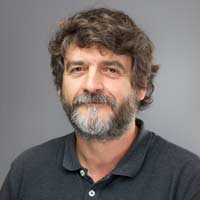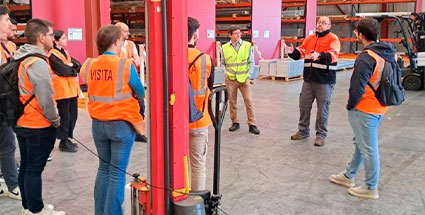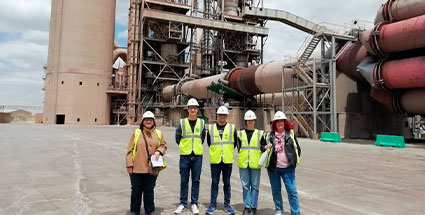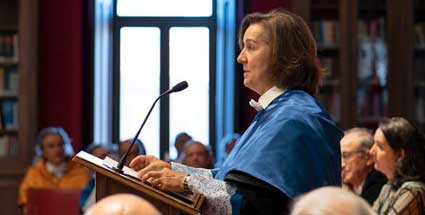Master’s Degree in Industrial Engineering

Natural continuation of the Bachelor’s Degree in Engineering in Industrial Technology
The Master's Degree in Industrial Engineering has a great tradition and has maintained its recognition over the years, being the reference master's degree in engineering, both nationally and internationally.
The Master's Degree in Industrial Engineering qualifies students¡, that is, it gives them access to the regulated profession of Industrial Engineer. The Master's degree will train students to manage innovation and technological development in their career from leadership positions.
It is characterized by comprehensive training in industrial technologies and confers competences in different subjects: advanced design of machines and motors, fluid machines and facilities, integrated manufacturing systems, industrial chemical processes, electrical engineering, automated process control, senior business management, financial and cost accounting, production organization and management, advanced facilities, engineering and construction, and transportation engineering.
Read +This postgraduate program has a strong technological character, preparing students for the management of high-level and complex projects. Likewise, it trains them to manage multidisciplinary teams, especially in the field of industrial companies.
The objective of the Master's degree in Industrial Engineering is to provide continuity for the Bachelor's Degree in Industrial Technologies Engineering, and grant at the end of the Master's degree the full professional attributions recognized by law in all industry specialties.
The Master's degree in Industrial Engineering is the perfect complement for Graduates in Engineering, in Industrial Technologies, or Graduates in the different industrial branches that qualify students to practice as Industrial Technical Engineer.
Read LessNebrija University celebrated the Opening Ceremony of the academic year at the Madrid-Princesa Campus.
Student profile: Graduate in Engineering in Industrial Technologies or in the different specialized industrial branches.
Graduate’s profile: Master's Degree in Industrial Engineering confers on its holders all the professional attributions of Industrial Engineers, which are included in the following decree:
Decree of September 18, 1935, published in the Official Gazette of Madrid no. 263 of September 20, 1935.
Art. 1. The degree grants its graduates full ability to design, implement and direct any class of installations and exploitations included in technical-industrial, chemical, mechanical and electrical branches and that of industrial economics (among which must be considered):
a) Steelmaking and metalworking in general. Chemical inorganic and chemical organic transformations. Food and clothing industries. Dry cleaning, tanning and ceramic arts. Fibernomic industries. Manufacturing or treatment of natural, animal and plant products. Silicon-based industries or graphic arts. Coal hydrogenation.
b) Metallic, mechanical and electrical construction industries, including those of precision. Hydraulic and civil constructions. River and maritime defense. Railroads, trams, air transport and auxiliary work, automobile and aerotechnical industries. Shipbuilding and naval construction workshops. Dry docks and dikes. Cinematographic industries. Heating, cooling, ventilation, lighting and sanitation. Capturing and use of public water for supply, irrigation or industries. Industries related to the civil defense of the population.
c) Generation, transformation, transportation and use of electrical energy in all its manifestations. Remote communications and, in general, anything that is included in the field of telecommunications, including the industrial acoustic, optical and radio-electrical applications.
Art. 2. Furthermore, the graduates are especially qualified to act, conduct and direct any class of studies, work and organizations in the economic-industrial, statistical, social and labor sphere. The verification, analysis and chemical, mechanical and electrical tests on materials, elements and installations of all classes. The involvement with matters of industrial ownership. The realization of topographical tasks, stoppages, appraisals and borders. Expert opinions, reports and technical actions in judicial, official and individual matters. The construction of industrial buildings and their annexes. Auxiliary industrial applications in urban construction. Any work that is assigned at any time by the current legislation and their fee rates.
Art. 3. In addition they have full capacity to sign any class of plans or documents that refer to the subjects included in the two previous articles and for the management and implementation of their works and installations without the Government being able to ignore this competence, or hamper it in the matters that must pass through public offices for their approval.
Official Degree:Master’s Degree in Industrial Engineering
Center responsible:Higher Polytechnic School
Branch of knowledge: Engineering and Architecture
Openings available:80
Total Credits:120 credits.
Minimum of 12 ECTS credits and maximum of 60 ECTS credits per enrollment and academic period.
Academic year in which it was implemented: 2014 -2015
Duration: 2 years
Type of Education: Classroom attendance
Academic Regulations: General student’s regulations. Credit transfer and recognition. Regulation of student participation. Common procedures for carrying out the Final Research Project
University Services: [+info]
Internal Quality Assurance System System managers Incidents, Suggestions and Complaints Job placement report and assessment of training received
Teaching methodology aimed at the development of innovative projects
Curriculum
BOE No. 65, of 17 March 2014
All our degrees and curricula have been prepared in accordance with the new guidelines set by current legislation, having already been verified by the National Agency for Quality Assessment.
The student must take 120 credits
First Year 60 ECTS
First Semester | 30 ECTS- 6 ECTS | Sources of energy and environmental impact
- 6 ECTS | Machines and installations of fluids
- 6 ECTS | Financial and cost accounting
- 6 ECTS | Design and calculation of structures
- 6 ECTS | Industrial instrumentation
Second Semester | 30 ECTS- 6 ECTS | Advanced design of machines and engines
- 6 ECTS | Organization and production management
- 6 ECTS | Industrial chemical processes
- 6 ECTS | Electrical engineering
- 6 ECTS | Automated control of processes
Second Year 60 ECTS
First Semester | 30 ECTS- 6 ECTS | Construction and infrastructures
- 6 ECTS | Advanced installations
- 3 ECTS | Transport engineering
- 6 ECTS | Integrated manufacturing systems
- 3 ECTS | Industrial plants
- 6 ECTS | Company senior management
Second Semester | 30 ECTS- 18 ECTS | Evaluation of the development of capacities in companies
- 12 ECTS | Final Research Project
Information of the Subjects
Professors
| Profesores Professors | Porcentaje de Doctores Percentage of PhD holders |
| 30 | 63,3% |
 Javier Sánchez Sierra
Director del Máster en Ingeniería Industrial
Director of the Master’s Degree in Industrial Engineering
Doctor Ingeniero Industrial por la Universidad de Navarra. Entre 1996 y 1999 trabaja en mecanizados especiales para automoción y aeronáutica (Widia-Kennametal, Alemania). De 2000 a 2008 es profesor investigador en la Universidad de Navarra, en temas de computación, programación CNC, rapid prototyping, diseño mecánico, modelado 3D y visualización. Su tesis doctoral se centra en el diseño y representación gráfica de estructuras tensadas, tras lo cual realiza un master en Estructuras Tensadas (Archineer) en Dessau, Alemania. Del 2008 al 2011 realiza estancia post-doctoral en la Universidad de Stanford, California (Center for Computer Research in Music and Acoustics) donde colabora en proyectos multidisciplinares relacionados con música, composición, procesado de audio, performances, visualización. Desde 2011 se dedica a la programación de dispositivos móviles como desarrollador freelance, con más de 30 apps en el AppStore. Es co-fundador de varias startups (Xculpture, Lingualia, Luraki, Flits Music). Ha sido profesor asociado en el Berklee College of Music (Campus de Valencia) y en la UPV. Actualmente es director de innovación en Tegus Medical GmbH (Hamburgo, Alemania), plataforma de videoconferencia especializada en asistencia y entrenamiento de intervenciones neurorradiológicas (ictus, aneurismas…).
Javier Sánchez Sierra
Director del Máster en Ingeniería Industrial
Director of the Master’s Degree in Industrial Engineering
Doctor Ingeniero Industrial por la Universidad de Navarra. Entre 1996 y 1999 trabaja en mecanizados especiales para automoción y aeronáutica (Widia-Kennametal, Alemania). De 2000 a 2008 es profesor investigador en la Universidad de Navarra, en temas de computación, programación CNC, rapid prototyping, diseño mecánico, modelado 3D y visualización. Su tesis doctoral se centra en el diseño y representación gráfica de estructuras tensadas, tras lo cual realiza un master en Estructuras Tensadas (Archineer) en Dessau, Alemania. Del 2008 al 2011 realiza estancia post-doctoral en la Universidad de Stanford, California (Center for Computer Research in Music and Acoustics) donde colabora en proyectos multidisciplinares relacionados con música, composición, procesado de audio, performances, visualización. Desde 2011 se dedica a la programación de dispositivos móviles como desarrollador freelance, con más de 30 apps en el AppStore. Es co-fundador de varias startups (Xculpture, Lingualia, Luraki, Flits Music). Ha sido profesor asociado en el Berklee College of Music (Campus de Valencia) y en la UPV. Actualmente es director de innovación en Tegus Medical GmbH (Hamburgo, Alemania), plataforma de videoconferencia especializada en asistencia y entrenamiento de intervenciones neurorradiológicas (ictus, aneurismas…).
 Antonio Alcocer Fernández-Pinilla
Profesor del área de Empresa
Professor of the Business area
Ingeniero Superior Industrial por la Universidad Pontificia de Comillas, ICAI; MSc. in Management por la Universidad de Birmingham, Master Executive en Finanzas por el ICADE, Doctor en Economía y Finanzas por la Universidad Europea de Madrid, Project Management Professional (PMP), European Financial Advisor (EFA), Sony Six Sigma Green Belt Certificate. Más de 20 años de experiencia profesional internacional a nivel de dirección en las áreas de consultoría, estrategia, desarrollo de negocio, marketing, finanzas y operaciones en entornos multinacionales (Unión Europea, Grupo Laureate International, Sony, PSA Citroën Peugeot, Agrolimen y MLP Private Finance). Actualmente es Director General, como consultor de negocio 360º en Alcocer&Co. Profesor asociado en diversas universidades y escuelas de negocio (Universidad Europea de Madrid en los programas de máster y grado en el área de Economía de la Empresa y Finanzas; Nebrija Business School; Escuela Politécnica Superior de la Universidad Nebrija; formador in-company Universidad Camilo José Cela y Presidente de Minds4change) en el área de Administración de Empresas (gesión de proyectos, emprendimiento, estrategia, finanzas corporativas, gestión de la calidad). Presidente de la asociación sin ánimo de lucro MInds4Change, que fomenta el emprendimiento, educación y desarrollo social y del canal educativo sobre finanzas.
Antonio Alcocer Fernández-Pinilla
Profesor del área de Empresa
Professor of the Business area
Ingeniero Superior Industrial por la Universidad Pontificia de Comillas, ICAI; MSc. in Management por la Universidad de Birmingham, Master Executive en Finanzas por el ICADE, Doctor en Economía y Finanzas por la Universidad Europea de Madrid, Project Management Professional (PMP), European Financial Advisor (EFA), Sony Six Sigma Green Belt Certificate. Más de 20 años de experiencia profesional internacional a nivel de dirección en las áreas de consultoría, estrategia, desarrollo de negocio, marketing, finanzas y operaciones en entornos multinacionales (Unión Europea, Grupo Laureate International, Sony, PSA Citroën Peugeot, Agrolimen y MLP Private Finance). Actualmente es Director General, como consultor de negocio 360º en Alcocer&Co. Profesor asociado en diversas universidades y escuelas de negocio (Universidad Europea de Madrid en los programas de máster y grado en el área de Economía de la Empresa y Finanzas; Nebrija Business School; Escuela Politécnica Superior de la Universidad Nebrija; formador in-company Universidad Camilo José Cela y Presidente de Minds4change) en el área de Administración de Empresas (gesión de proyectos, emprendimiento, estrategia, finanzas corporativas, gestión de la calidad). Presidente de la asociación sin ánimo de lucro MInds4Change, que fomenta el emprendimiento, educación y desarrollo social y del canal educativo sobre finanzas.
 Jesús Alonso Barriuso
Profesor del área de Procesos Industriales
Professor of the area of Industrial Processes
Ingeniero Industrial por la Universidad Carlos III de Madrid en la especialidad de Electrónica y Automática. Profesor/Tutor CFGS Automatización y Robótica Industrial desde el año 2000 en el Instituto Politécnico Salesianos Atocha en módulos de Robótica Industrial, Comunicaciones Industriales, Sistemas de Automatización y Scadas. Certificaciones oficiales de redes CCNA (CISCO) e Instructor Oficial de Labview de National Instruments (CPI). Cursos Oficiales de Robótica de ABB y Sistemas de Automatización Industrial de Siemens (PLCs, Scada WinCC, Paneles Táctiles, Profibus,Ethernet/Profinet, Variadores de Frecuencia…).
Jesús Alonso Barriuso
Profesor del área de Procesos Industriales
Professor of the area of Industrial Processes
Ingeniero Industrial por la Universidad Carlos III de Madrid en la especialidad de Electrónica y Automática. Profesor/Tutor CFGS Automatización y Robótica Industrial desde el año 2000 en el Instituto Politécnico Salesianos Atocha en módulos de Robótica Industrial, Comunicaciones Industriales, Sistemas de Automatización y Scadas. Certificaciones oficiales de redes CCNA (CISCO) e Instructor Oficial de Labview de National Instruments (CPI). Cursos Oficiales de Robótica de ABB y Sistemas de Automatización Industrial de Siemens (PLCs, Scada WinCC, Paneles Táctiles, Profibus,Ethernet/Profinet, Variadores de Frecuencia…).
 Roberto Álvarez Fernández
Director del Departamento Escuela de Ingeniería Industrial
Roberto Álvarez Fernández
Director del Departamento Escuela de Ingeniería IndustrialDirector de Trabajos Fin de Máster Director of the School of Industrial Engineering Department
Director of Master's Thesis Doctor en Ingeniería Industrial especialidad en Ingeniería de los procesos de fabricación. Ingeniero Industrial especialidad en electrotecnia y especialidad en organización de la producción. Profesor acreditado en las figuras de contratado doctor y profesor de universidad privada. 22 años de experiencia docente y 14 años de experiencia investigadora. Cuenta con dos sexenios de investigación, más de 1400 citas en Google Scholar Citations, 24 artículos en revistas indexadas en el JCR (Journal Citations Reports) de los cuales 15 corresponden al primer cuartil (Q1). Ha publicado dos libros con la editorial Springer y numerosos capítulos de libros, participaciones en congresos y charlas, tanto nacionales como internacionales. Su línea de investigación se centra en la sostenibilidad en el uso de las infraestructuras urbanas y el consumo de energía, incluyendo la actividad industrial, la movilidad y la cuantificación de las emisiones de gases de efecto invernadero debida a dichas actividades.
 Alberto Aniz Lecuona
Profesor del área de Ingeniería Eléctrica y Electrónica
Professor of the area of Electrical and Electronic Engineering
Ingeniero Industrial por la Universidad Pontificia de Comillas (ICAI) 1997. Su trayectoria profesional se desarrolla principalmente dentro del grupo Iberdrola. Donde se incorpora en el año 2000 al área de ingeniería, participando en proyectos de subestaciones eléctricas y plantas de generación renovable en el departamento de control, protecciones y telecomunicaciones. En el año 2006 es nombrado jefe del área de telecomunicaciones para proyectos de distribución, transporte y renovables. En esta etapa participó en el lanzamiento internacional de Iberdrola, formando parte en proyectos de distribución, transporte y generación de renovables en Reino Unido, Estados Unidos, México, Brasil y en otros países. Desde 2017 forma parte del departamento de Smart Grids Global donde ha ocupado diferentes responsabilidades. Actualmente es responsable de automatización reportando a la dirección de Digitalización del negocio global de Redes.
Alberto Aniz Lecuona
Profesor del área de Ingeniería Eléctrica y Electrónica
Professor of the area of Electrical and Electronic Engineering
Ingeniero Industrial por la Universidad Pontificia de Comillas (ICAI) 1997. Su trayectoria profesional se desarrolla principalmente dentro del grupo Iberdrola. Donde se incorpora en el año 2000 al área de ingeniería, participando en proyectos de subestaciones eléctricas y plantas de generación renovable en el departamento de control, protecciones y telecomunicaciones. En el año 2006 es nombrado jefe del área de telecomunicaciones para proyectos de distribución, transporte y renovables. En esta etapa participó en el lanzamiento internacional de Iberdrola, formando parte en proyectos de distribución, transporte y generación de renovables en Reino Unido, Estados Unidos, México, Brasil y en otros países. Desde 2017 forma parte del departamento de Smart Grids Global donde ha ocupado diferentes responsabilidades. Actualmente es responsable de automatización reportando a la dirección de Digitalización del negocio global de Redes.
 Juan Carlos Arroyo Portero
Director de la Escuela Politécnica Superior
Juan Carlos Arroyo Portero
Director de la Escuela Politécnica SuperiorDirector de Trabajos Fin de Máster Director of the Polytechnic School
Director of Master's Thesis Ingeniero de caminos, canales y puertos (UPM, 1990). Doctor en arquitectura (UCJC, 2017). Fundador de CALTER ingeniería (1997), CINTER divulgación técnica (2000), Ingenio.xyz (2005). Comienza a investigar en la ETSICCP de la UPM (1990) sobre juntas de dilatación, lo que le llevó a proyectar el récord del mundo de estructura sin juntas (1998, Aldaia). Ha publicado numerosos artículos de investigación y realizaciones en las revistas españolas del sector y en los congresos internacionales celebrados en España en los últimos 25 años. Es autor de varias patentes, dos sobre estructuras plegables, una sobre nudos prefabricados en la unión entre dovelas de torres eólicas prefabricadas de hormigón y una patente de construcción modular de edificios 3D. Entre sus publicaciones: prontuario informático del hormigón en 1992, un libro y software gratuito imprescindible de las oficinas españolas de proyecto de estructuras. Números gordos en el proyecto de estructuras en 2001. Coautor de las ediciones 15ª y 16ª de Hormigón armado, Jiménez Montoya. Profesor desde 1992 en numerosos cursos de postgrado (UNED, Universidad de Sevilla, UPC y UPM). Ha dirigido cursos de verano en la UCJC, y cursos de experto en la Universidad de Catilla la Mancha y el Master de estructuras de edificación de la UNED y la Escuela de la Edificación. Ha sipo profesor asociado en la ETSICCP, EUAT y ETSAM de la UPM. Como ingeniero estructural, entre sus obras más destacadas se cuentan, entre otras: los aeropuertos de Cali, Reus, Ciudad Real, y la T4 de Barajas (en colaboración); la Biblioteca del Estado en Santiago de Compostela; la comisaría local de la Policía de Plasencia; el Recinto ferial de A Coruña; la rehabilitación de la Fundación Jiménez Díaz; más de cien torres eólicas de hormigón; la remonta de las Torres Colón.
 Francisco Badea Romero
Profesor del área de Ingeniería Mecánica
Professor of the Mechanical Engineering area
Doctor en Ingeniería Mecánica por la Universidad Politécnica de Madrid. Ingeniero de Automóviles por la Universidad Politécnica de Bucarest (2002-2007). Ha realizado dos Máster, uno en Ingeniería Mecánica (Universidad Politécnica de Madrid) y otro en Ingeniería de Automóviles (Universidad de Bucarest). Doctorado en Ingeniería Mecánica (2014) en la Universidad Politécnica de Madrid. Ha sido profesor del Máster en Automoción INSIA-UPM (Vibraciones, análisis modales, harmónicos y transitorios mediante elementos finitos) entre 2010/2015. Profesor universitario acreditado a la figura profesor ayudante doctor por la ANECA.
Su experiencia en investigación ha estado relacionada con el Instituto universitario de investigación del automóvil (Madrid) - 03/2009-12/2014 y con el Georgia Institute of Technology (Atlanta) – 05/2011-09/2011. Actualmente con el Grupo Nebrija de Ingeniería de Vehículos GREEN.
Más de ocho años de experiencia docente en la Universidad Nebrija en asignaturas relacionadas con teoría de máquinas, cálculo y diseño avanzado de máquinas e ingeniería por ordenador.
Francisco Badea Romero
Profesor del área de Ingeniería Mecánica
Professor of the Mechanical Engineering area
Doctor en Ingeniería Mecánica por la Universidad Politécnica de Madrid. Ingeniero de Automóviles por la Universidad Politécnica de Bucarest (2002-2007). Ha realizado dos Máster, uno en Ingeniería Mecánica (Universidad Politécnica de Madrid) y otro en Ingeniería de Automóviles (Universidad de Bucarest). Doctorado en Ingeniería Mecánica (2014) en la Universidad Politécnica de Madrid. Ha sido profesor del Máster en Automoción INSIA-UPM (Vibraciones, análisis modales, harmónicos y transitorios mediante elementos finitos) entre 2010/2015. Profesor universitario acreditado a la figura profesor ayudante doctor por la ANECA.
Su experiencia en investigación ha estado relacionada con el Instituto universitario de investigación del automóvil (Madrid) - 03/2009-12/2014 y con el Georgia Institute of Technology (Atlanta) – 05/2011-09/2011. Actualmente con el Grupo Nebrija de Ingeniería de Vehículos GREEN.
Más de ocho años de experiencia docente en la Universidad Nebrija en asignaturas relacionadas con teoría de máquinas, cálculo y diseño avanzado de máquinas e ingeniería por ordenador.
 Rafael Barea del Cerro
Coordinador del programa de doctorado
Rafael Barea del Cerro
Coordinador del programa de doctoradoProfesor de las áreas de Materiales y Procesos Industriales
Director de Trabajos Fin de Máster Coordinator of the doctoral program
Professor of the areas of Materials and Industrial Processes
Director of Master's Thesis Doctor por la UAM, Ingeniero de Materiales por la UPM, Licenciado en CC Físicas y Diplomado en Magisterio por la UCM. Especialista universitario en elementos finitos en problemas térmicos por la UNED. Experiencia investigadora durante más de 20 años en diferentes centros del CSIC y en la Universidad Nebrija. Profesor titular por la ANECA, posee tres sexenios de investigación. Especialidades: procesamiento y caracterización de materiales cerámicos y metálicos, en modelos matemáticos y simulación (redes neuronales, lógica difusa, inteligencia artificial, elementos finitos, modelización de propiedades no lineales de materiales...). Actualmente trabajando en el área de fabricación aditiva en inoxidables, en propiedades mecánicas de aleaciones de magnesio y electromagnéticas de perovskitas con orientación a la fabricación de piezas y sensores de la industria del transporte (aviones, trenes, barcos y automóviles).
 Patricia Benítez Hernández
Profesora del área de Estructuras
Patricia Benítez Hernández
Profesora del área de EstructurasDirectora de Trabajos Fin de Máster Professor of the area of Structures
Director of Final Master's Projects Doctora por la Universidad Politécnica de Madrid. Estudió arquitectura en la Escuela Técnica Superior de Arquitectura de Madrid (ETSAM) así como en Rheinisch Westfälische Technische Hochschule (RWTH) en Aachen, Alemania. Obtuvo el título de Arquitecto con la especialidad en Estructuras por la Universidad Politécnica de Madrid (UPM) en 1998 y el título de Doctor por la misma universidad en 2016. Sus investigaciones se centran en el Patrimonio Arquitectónico, concretamente en la influencia que la integración de los nuevos criterios de sostenibilidad y materiales ejercen sobre su estructura. Desde 2003 y hasta 2012 fue profesora dentro del área de las Estructuras en la Architecture School de IE University en Segovia, donde pudo combinar sus actividades docentes con su actividad profesional en empresas del sector de la ingeniería y construcción.
 Jesús Briones Delgado
Profesor del área de Empresa
Jesús Briones Delgado
Profesor del área de EmpresaDirector de Trabajos Fin de Máster Professor of the Business area
Director of Final Master's Projects Doctor en problemas contemporáneos de la sociedad de la información por la UCM, licenciado en Filosofía y en Ciencias del Trabajo y Graduado Social Diplomado. MBA en Comercio Electrónico por la EOI. Ha desarrollado su carrera profesional en el Grupo CEPSA. Comenzó su trayectoria como técnico comercial en la unidad de ventas directas de combustibles y carburantes de donde fue pasando a otras áreas comerciales de la Compañía. En el año 2001 se integró en la Dirección de Recursos Humanos, en el área de Formación y Desarrollo de la que fue responsable. Actualmente, es Human Resources Business Partner de las unidades corporativas funcionales, así como de Trading y Búnker. Es ponente habitual en temas relacionados con el liderazgo, el desarrollo de personas, la formación y la aplicación de las competencias digitales derivadas de la nueva economía en los ámbitos empresariales. Es también profesor y colaborador de desarrollo directivo y liderazgo en diversos másteres y universidades. Miembro del claustro del Senior Management Program in Digital Talent del ICEDM – ESIC. Autor del libro Promesas y realidades de la “revolución tecnológica” editorial Catarata 2016 y de otras publicaciones.
 Juan José Coble Castro
Coordinador del área de Física
Juan José Coble Castro
Coordinador del área de FísicaProfesor de las áreas de Energía y Medio Ambiente
Director de Trabajos Fin de Máster Coordinator of the Physics area
Professor of the areas of Energy and Environment
Director of Final Master Projects Dr. Ingeniero Industrial por la UNED, especialidad Química. Ingeniero Industrial por la UPM, especialidad Química. Máster en Formación del Profesorado de ESO y Bachillerato, FP y Enseñanza de idiomas por la Universidad Nebrija. Colabora en trabajos de investigación sobre termoeconomía y cuantificación del impacto ambiental aplicado al análisis de sistemas de producción de energía. Estas colaboraciones se siguen realizando en la actualidad con el departamento de Química aplicada a la Ingeniería Industrial de la UNED. Ha compaginado la actividad docente con labores de consultoría en temas de energía y medio ambiente (estudios de impacto ambiental, estudios de incidencia ambiental, estudios de generación y gestión de residuos, estudios energéticos, análisis de campo de contaminación electromagnética, etc.) con distintas empresas de consultoría del sector medioambiental.
 Sergio Corbera Caraballo
Coordinador del área de Automóvil y Mecánica
Sergio Corbera Caraballo
Coordinador del área de Automóvil y MecánicaProfesor del área de Expresión Gráfica
Director de Trabajos Fin de Máster Coordinator of the Automobile and Mechanics area
Teacher of the Graphic Expression area
Director of Final Master's Projects Doctor en Tecnologías industriales e informáticas por la Universidad Nebrija. Ingeniero técnico Industrial, especialidad Mecánica, por la Universidad Politécnica de Madrid. Máster en Máquinas Avanzadas y Transportes por la Universidad Carlos III. Máster en Modelos y Métodos de Optimización por la UNED. Experiencia en el cálculo de estructuras en el sector aeronáutico. Cuatro años de experiencia en el desarrollo de motos de competición en la Universidad Politécnica de Madrid, consiguiendo el Premio a la Mejor Innovación Tecnológica en Motostudent 2012. Dos años de experiencia en el cálculo de estructuras en el sector aeronáutico. Seis años de experiencia en el desarrollo y optimización de estructuras para góndolas (Building Maintenance Units) mediante técnicas de inteligencia artificial. Responsable de simulación del departamento técnico de la empresa SAF Góndolas. Experiencia en el diseño y desarrollo de coches de altas prestaciones tipo fórmula (Catia y Dinámica Vehicular). Coordinador del Máster en Ingeniería de Vehículos de Competición y coordinador del proyecto Motostudent, de la Universidad Nebrija. Profesor e investigador de la Universidad Nebrija desde 2014. Su actividad investigadora se centra en el desarrollo de algoritmos de optimización basados en teorías evolutivas, redes neuronales e inteligencia artificial para la automatización del proceso de diseño de productos industriales, especialmente vehículos tipo motocicleta. Se trata de una línea de investigación completamente orientada al mundo de la industria.
 Fernando Chavarri Dicenta
Profesor del área de Empresa
Professor of the Company area
Doctor en Ciencias por la Universidad Politécnica de Madrid (2002). 28 años de práctica laboral en Finanzauto S.A, distribuidor en España de Caterpillar (1966-93) como: Director de Delegación (1969-76). Subdirector de Motores (1976-78). Subdirector de Marketing (1978-80). Subdirector de Proceso de Datos (1980-83). Director de Desarrollo (1983-93) (comprende Recursos Humanos y Proceso de Datos).Consejero Delegado de STET, Caterpillar Portugal (1990-93). Miembro del Comité de Dirección (1980 -1993. Profesor Doctor Asociado de la Escuela Técnica Superior de Ingenieros de Telecomunicación (UPM) (1997-2010). Profesor de Estrategia en los Máster MBA y MDSIC de la UPM (1994- ). Profesor de Calidad Total en el Máster MBA de la UPM (1994-). Profesor de Calidad Total de CEPADE. Cofundador y Director del Grupo de Reingeniería Estratégica, consultora integrada en la UPM y especializada en el análisis e implantación del Modelo de Gestión de Calidad total en las empresas, siendo varias las empresas que pueden servir de referencia.
Fernando Chavarri Dicenta
Profesor del área de Empresa
Professor of the Company area
Doctor en Ciencias por la Universidad Politécnica de Madrid (2002). 28 años de práctica laboral en Finanzauto S.A, distribuidor en España de Caterpillar (1966-93) como: Director de Delegación (1969-76). Subdirector de Motores (1976-78). Subdirector de Marketing (1978-80). Subdirector de Proceso de Datos (1980-83). Director de Desarrollo (1983-93) (comprende Recursos Humanos y Proceso de Datos).Consejero Delegado de STET, Caterpillar Portugal (1990-93). Miembro del Comité de Dirección (1980 -1993. Profesor Doctor Asociado de la Escuela Técnica Superior de Ingenieros de Telecomunicación (UPM) (1997-2010). Profesor de Estrategia en los Máster MBA y MDSIC de la UPM (1994- ). Profesor de Calidad Total en el Máster MBA de la UPM (1994-). Profesor de Calidad Total de CEPADE. Cofundador y Director del Grupo de Reingeniería Estratégica, consultora integrada en la UPM y especializada en el análisis e implantación del Modelo de Gestión de Calidad total en las empresas, siendo varias las empresas que pueden servir de referencia.
 Juan de Norverto Moríñigo
Profesor del área de Ingeniería Mecánica y de Proyectos
Professor of the area of Mechanical Engineering and Projects
Ingeniero Industrial ICAI con Master de Automoción por la UPM. Experiencia laboral de más de 14 años en el sector de Automoción en las empresas Nissan, Robert Bosch y Millard filters. Experiencia docente durante más de 15 años en ICAI, Universidad Carlos II de Madrid y Universidad Antonio de Nebrija, habiendo impartido, además de Motores térmicos, otras asignaturas del área de termodinámica. En la actualidad es Director técnico de la empresa Millard Filters S.L.
Juan de Norverto Moríñigo
Profesor del área de Ingeniería Mecánica y de Proyectos
Professor of the area of Mechanical Engineering and Projects
Ingeniero Industrial ICAI con Master de Automoción por la UPM. Experiencia laboral de más de 14 años en el sector de Automoción en las empresas Nissan, Robert Bosch y Millard filters. Experiencia docente durante más de 15 años en ICAI, Universidad Carlos II de Madrid y Universidad Antonio de Nebrija, habiendo impartido, además de Motores térmicos, otras asignaturas del área de termodinámica. En la actualidad es Director técnico de la empresa Millard Filters S.L.
 María Rosario Elvira Lavilla
Profesora del área de Química
Professor of the Chemistry area
Doctor en Ciencias Químicas por la Universidad de Alcalá. Profesora Asociada de la Escuela Politécnica Superior de la Universidad Antonio de Nebrija; imparte la asignatura de Ingeniería Química desde el curso 2013/14 hasta la actualidad.
María Rosario Elvira Lavilla
Profesora del área de Química
Professor of the Chemistry area
Doctor en Ciencias Químicas por la Universidad de Alcalá. Profesora Asociada de la Escuela Politécnica Superior de la Universidad Antonio de Nebrija; imparte la asignatura de Ingeniería Química desde el curso 2013/14 hasta la actualidad.Profesora de Ingeniería Química en la Universidad de Alcalá durante 23 años, responsable directa de asignaturas pertenecientes a la Licenciatura de Química y Grado de Química: Ingeniería química, Química Industrial, Tratamiento de gases; Producción de Principios activos; Redacción y Ejecución de Proyectos; Tratamiento de Aguas Industriales. Participante en asignaturas del Grado en Medio Ambiente. Así mismo, he llevado a cabo el diseño y desarrollo de nuevas prácticas de laboratorio tanto en el entorno de la Ingeniería Química como de la Ingeniería Medioambiental.
Labor investigadora principal centrada en el área de la Ciencia de Materiales: Diseño y estudio por simulación de hornos multifuncionales de fusión de vidrios especiales y mezclas vitrificables para diversas aplicaciones; desarrollo de nuevos materiales híbridos orgánico-inorgánicos porosos con actividad biocida y descontaminante mediante el proceso sol-gel; investigación y desarrollo de nuevos materiales multifuncionales para tratamientos superficiales de protección y tratamiento de materiales de construcción para edificación nueva y de Patrimonio Histórico y Cultural.
 Luis García Cervantes
Profesor del área de Ingeniería Eléctrica y Electrónica
Professor of the area of Electrical and Electronic Engineering
Ingeniero de Telecomunicación, especialidad de microelectrónica por la UPM (1992). Doce años en SPASOLAB (Space Solar Cell Laboratory), laboratorio externo de la Agencia Espacial Europea, como ingeniero de soporte y desarrollo de sistemas de medida para células solares de aplicación espacial. Participación como responsable de ensayos de choques térmicos tanto en células solares como en probetas de materiales utilizados en diferentes proyectos espaciales (ROSSETTA, ATV, SOHO, MSG, MINISAT 01, GOCCE, E3000, HERSCHEL, etc.). Quince años como Ingeniero especialista de comunicaciones para la certificación y calificación de aeronaves militares en el Área de Sistemas Aeronáuticos del Dpto. de Aeronaves y Armamento del Instituto Nacional de Técnica Aeroespacial (INTA). LNAAR (Lead National Airworthiness Authority Representatives) del subsistema de COMUNICACIONES del proyecto internacional EUROFIGHTER (Avión de Combate Europeo) así como la coordinación del panel de Comunicaciones a nivel internacional con la industria. NAAR (National Airworthiness Authority Representative) del subsistema IMRS (Integrated Monitoring and Recording System) del proyecto internacional EUROFIGHTER. Especialista para la certificación de sistemas de comunicaciones y soporte al sistema de aviónica y al sistema de misión en plataformas como: EUROMALE RPAS (European Medium Altitude Long Endurance Remotely Piloted Aircraft System), MRTT (Multi-Role Transport Tanker) para la fuerza aérea francesa (FAF), gobierno de Singapur (GoS), fuerza aérea australiana (RAAF) y fuerza aérea británica (RAF). Actualmente es responsable de aseguramiento de Calidad en el Dpto. de Ensayos de Equipos y Sistemas del Instituto Nacional de Técnica Aeroespacial (INTA) como responsable de auditorías internas y externas de las diferentes áreas y laboratorios que componen el Departamento, elaboración de ofertas y coordinación de proyectos interdisciplinares de las diferentes Áreas que componen el Departamento. En 2015 fue condecorado con la Medalla al Mérito aeronáutico con distintivo blanco por el Ministerio de Defensa de España. Orden 300/07991/15 (BOD nº 118). Profesor asociado en la Escuela Politécnica Superior de la Universidad Antonio de Nebrija desde 2001.
Luis García Cervantes
Profesor del área de Ingeniería Eléctrica y Electrónica
Professor of the area of Electrical and Electronic Engineering
Ingeniero de Telecomunicación, especialidad de microelectrónica por la UPM (1992). Doce años en SPASOLAB (Space Solar Cell Laboratory), laboratorio externo de la Agencia Espacial Europea, como ingeniero de soporte y desarrollo de sistemas de medida para células solares de aplicación espacial. Participación como responsable de ensayos de choques térmicos tanto en células solares como en probetas de materiales utilizados en diferentes proyectos espaciales (ROSSETTA, ATV, SOHO, MSG, MINISAT 01, GOCCE, E3000, HERSCHEL, etc.). Quince años como Ingeniero especialista de comunicaciones para la certificación y calificación de aeronaves militares en el Área de Sistemas Aeronáuticos del Dpto. de Aeronaves y Armamento del Instituto Nacional de Técnica Aeroespacial (INTA). LNAAR (Lead National Airworthiness Authority Representatives) del subsistema de COMUNICACIONES del proyecto internacional EUROFIGHTER (Avión de Combate Europeo) así como la coordinación del panel de Comunicaciones a nivel internacional con la industria. NAAR (National Airworthiness Authority Representative) del subsistema IMRS (Integrated Monitoring and Recording System) del proyecto internacional EUROFIGHTER. Especialista para la certificación de sistemas de comunicaciones y soporte al sistema de aviónica y al sistema de misión en plataformas como: EUROMALE RPAS (European Medium Altitude Long Endurance Remotely Piloted Aircraft System), MRTT (Multi-Role Transport Tanker) para la fuerza aérea francesa (FAF), gobierno de Singapur (GoS), fuerza aérea australiana (RAAF) y fuerza aérea británica (RAF). Actualmente es responsable de aseguramiento de Calidad en el Dpto. de Ensayos de Equipos y Sistemas del Instituto Nacional de Técnica Aeroespacial (INTA) como responsable de auditorías internas y externas de las diferentes áreas y laboratorios que componen el Departamento, elaboración de ofertas y coordinación de proyectos interdisciplinares de las diferentes Áreas que componen el Departamento. En 2015 fue condecorado con la Medalla al Mérito aeronáutico con distintivo blanco por el Ministerio de Defensa de España. Orden 300/07991/15 (BOD nº 118). Profesor asociado en la Escuela Politécnica Superior de la Universidad Antonio de Nebrija desde 2001.
 Francisco Javier García De La Hera
Profesor del área de Estructuras
Professor of the Structures area
Ingeniero de Caminos, Canales y Puertos, especialidad obras hidráulicas e hidrología por la Universidad de Burgos y BIM management en infraestructuras y obra civil por la Universidad Católica San Antonio de Murcia.
Actualmente es el director de construcción en Ethical Power Spain, S. L. dedicado a la construcción y diseño de grandes parques fotovoltáicos.
Más de quince años de experiencia en el sector de la construcción y energías renovables en España y Reino Unido, especialmente en el diseño y ejecución de plantas de biometano y plantas fotovoltaicas y en la dirección de grandes infraestructuras de obra civil.
Desde 2019 compagina su actividad profesional como docente en la Universidad Nebrija en el Master Universitario de Ingeniería Industrial y en el Master de Energías Renovables y Eficiencia Energética.
Francisco Javier García De La Hera
Profesor del área de Estructuras
Professor of the Structures area
Ingeniero de Caminos, Canales y Puertos, especialidad obras hidráulicas e hidrología por la Universidad de Burgos y BIM management en infraestructuras y obra civil por la Universidad Católica San Antonio de Murcia.
Actualmente es el director de construcción en Ethical Power Spain, S. L. dedicado a la construcción y diseño de grandes parques fotovoltáicos.
Más de quince años de experiencia en el sector de la construcción y energías renovables en España y Reino Unido, especialmente en el diseño y ejecución de plantas de biometano y plantas fotovoltaicas y en la dirección de grandes infraestructuras de obra civil.
Desde 2019 compagina su actividad profesional como docente en la Universidad Nebrija en el Master Universitario de Ingeniería Industrial y en el Master de Energías Renovables y Eficiencia Energética.
 Javier García Martín
Profesor del área de Ingeniería Eléctrica y Electrónica
Professor of Electrical and Electronic Engineering
Ingeniero Industrial por la UNED, Ingeniero Técnico Industrial por la UPM y Project Management Professional por el PMI.
Más de 23 años de experiencia laboral liderando equipos multidisciplinares y gestionando proyectos internacionales de Energía (Oil & Gas, Generación Convencional y Renovable, T&D) y otros sectores industriales en todas sus fases, desempeñando labores técnicas y de gestión, con especial dedicación a la dirección estratégica, gestión de contratos, gestión de la calidad, estandarización y optimización de procesos y métodos, mejora continua, generación de valor, cadena de suministro, ingeniería, energía, electricidad e instrumentación y control.
Cuenta con amplia experiencia docente adquirida con alumnado universitario y preuniversitario en ámbito particular y academias privadas, así como durante la realización de su actividad profesional en la empresa privada, la cual compagina con la actividad docente, donde aporta su amplia experiencia laboral. Actualmente profesor asociado en la Escuela Politécnica de la Universidad Antonio de Nebrija.
Javier García Martín
Profesor del área de Ingeniería Eléctrica y Electrónica
Professor of Electrical and Electronic Engineering
Ingeniero Industrial por la UNED, Ingeniero Técnico Industrial por la UPM y Project Management Professional por el PMI.
Más de 23 años de experiencia laboral liderando equipos multidisciplinares y gestionando proyectos internacionales de Energía (Oil & Gas, Generación Convencional y Renovable, T&D) y otros sectores industriales en todas sus fases, desempeñando labores técnicas y de gestión, con especial dedicación a la dirección estratégica, gestión de contratos, gestión de la calidad, estandarización y optimización de procesos y métodos, mejora continua, generación de valor, cadena de suministro, ingeniería, energía, electricidad e instrumentación y control.
Cuenta con amplia experiencia docente adquirida con alumnado universitario y preuniversitario en ámbito particular y academias privadas, así como durante la realización de su actividad profesional en la empresa privada, la cual compagina con la actividad docente, donde aporta su amplia experiencia laboral. Actualmente profesor asociado en la Escuela Politécnica de la Universidad Antonio de Nebrija.
 Faustino Guillén Minguito
Profesor del área de Estructuras
Professor of the area of Structures
Ingeniero Industrial por la Universidad Politécnica de Madrid (1988). MBA por el IESE (1996). Investigador en el departamento eléctrico de la Escuela de Ingenieros Industriales entre 1985 y 1989. En 1989 se vincula a IDOM, firma en la que ha desarrollado la totalidad de su carrera profesional hasta el momento. Ha desempeñado puestos de ingeniero de proyectos, responsable del área eléctrica, director del área de ingeniería industrial y socio y director del área de industria y energía. En la actualidad dirige el área de ingeniería Industrial, transporte de energía eléctrica y centrales hidroeléctricas en IDOM y pertenece a su comité de dirección. Durante su carrera ha dirigido numerosos proyectos de plantas industriales en todos los sectores (bebidas y alimentación, siderurgia, logística, energía y medio ambiente…), tanto en España como en el ámbito internacional. Entre ellos, la “Modernización de la refinería de Talara” en Perú, y el equipo de Gestión de proyectos para la agencia europea “Fusion for Energy” en el proyecto ITER (International Thermonuclear Experimental Reactor) en Francia, participando en ambos durante años en los consejos de dirección de los consorcios formados con otras empresas de ámbito internacional. Siempre ha estado vinculado a la Ingeniería Industrial, ha sido miembro de la Junta de Dirección del Colegio de Ingenieros Industriales de Madrid durante ocho años y de otros organismos y plataformas del sector. En el ámbito docente, ha sido profesor asociado de proyectos en la Universidad Carlos III de Madrid y en las universidades TECNUN - Escuela de Ingeniería de la Universidad de Navarra y, Universidad Nebrija (actualmente), en materias de ingeniería industrial e instalaciones electromecánicas.
Faustino Guillén Minguito
Profesor del área de Estructuras
Professor of the area of Structures
Ingeniero Industrial por la Universidad Politécnica de Madrid (1988). MBA por el IESE (1996). Investigador en el departamento eléctrico de la Escuela de Ingenieros Industriales entre 1985 y 1989. En 1989 se vincula a IDOM, firma en la que ha desarrollado la totalidad de su carrera profesional hasta el momento. Ha desempeñado puestos de ingeniero de proyectos, responsable del área eléctrica, director del área de ingeniería industrial y socio y director del área de industria y energía. En la actualidad dirige el área de ingeniería Industrial, transporte de energía eléctrica y centrales hidroeléctricas en IDOM y pertenece a su comité de dirección. Durante su carrera ha dirigido numerosos proyectos de plantas industriales en todos los sectores (bebidas y alimentación, siderurgia, logística, energía y medio ambiente…), tanto en España como en el ámbito internacional. Entre ellos, la “Modernización de la refinería de Talara” en Perú, y el equipo de Gestión de proyectos para la agencia europea “Fusion for Energy” en el proyecto ITER (International Thermonuclear Experimental Reactor) en Francia, participando en ambos durante años en los consejos de dirección de los consorcios formados con otras empresas de ámbito internacional. Siempre ha estado vinculado a la Ingeniería Industrial, ha sido miembro de la Junta de Dirección del Colegio de Ingenieros Industriales de Madrid durante ocho años y de otros organismos y plataformas del sector. En el ámbito docente, ha sido profesor asociado de proyectos en la Universidad Carlos III de Madrid y en las universidades TECNUN - Escuela de Ingeniería de la Universidad de Navarra y, Universidad Nebrija (actualmente), en materias de ingeniería industrial e instalaciones electromecánicas.
 Jesús Guzmán Mínguez
Profesor de las áreas de Química y de Materiales
Professor of the areas of Chemistry and Materials
Doctor en Física de los Materiales por la Universidad Autónoma de Madrid (UAM) y Licenciado en Ciencias Químicas por la Universidad Complutense de Madrid (UCM). Máster en Ciencia y Tecnología de Nuevos Materiales (CyTNM) por la Universidad de Sevilla (US). El doctorado fue realizado en el Instituto de Cerámica y Vidrio que pertenece al CSIC. Acreditado para las figuras docentes de Profesor Contratado Doctor y Profesor de Universidad Privada por la ANECA. Experto en el procesamiento de cerámicas funcionales con propiedades magnéticas obtenidas por métodos sostenibles como la síntesis de combustión a baja temperatura, así como el diseño de nuevos imanes permanentes que son potencialmente útiles para la sustitución de imanes basados en Tierras Raras. Miembro de la Sociedad Española de Cerámica y Vidrio desde 2017. Primer premio a la mejor ponencia en el Congreso de Jóvenes Investigadores del ICV-CSIC (2017). Investigador en el Grupo de Materiales y Fabricación Aditiva (MOD3RN) y profesor en la Escuela Politécnica Superior de la Universidad Nebrija.
Jesús Guzmán Mínguez
Profesor de las áreas de Química y de Materiales
Professor of the areas of Chemistry and Materials
Doctor en Física de los Materiales por la Universidad Autónoma de Madrid (UAM) y Licenciado en Ciencias Químicas por la Universidad Complutense de Madrid (UCM). Máster en Ciencia y Tecnología de Nuevos Materiales (CyTNM) por la Universidad de Sevilla (US). El doctorado fue realizado en el Instituto de Cerámica y Vidrio que pertenece al CSIC. Acreditado para las figuras docentes de Profesor Contratado Doctor y Profesor de Universidad Privada por la ANECA. Experto en el procesamiento de cerámicas funcionales con propiedades magnéticas obtenidas por métodos sostenibles como la síntesis de combustión a baja temperatura, así como el diseño de nuevos imanes permanentes que son potencialmente útiles para la sustitución de imanes basados en Tierras Raras. Miembro de la Sociedad Española de Cerámica y Vidrio desde 2017. Primer premio a la mejor ponencia en el Congreso de Jóvenes Investigadores del ICV-CSIC (2017). Investigador en el Grupo de Materiales y Fabricación Aditiva (MOD3RN) y profesor en la Escuela Politécnica Superior de la Universidad Nebrija.
 Ingo Kaiser
Profesor del área de Fundamentos de la Física
Professor of the Fundamentals of Physics area
Doctor Ingeniero por la Facultad de Ingeniería Mecánica de la Universidad Hannover (Alemania). Colaborador científico e investigador asistente en la Universidad de Hannover (Alemania) y en el Centro Aeroespacial Alemán (DLR) Oberpfaffenhofen (Alemania, cerca de Munich). Además, era vice-director del DLR_School_Lab (Laboratorio de Escuela) Oberpfaffenhofen. Su investigación está focalizada en la simulación computacional de vehículos ferroviarios. Sus estudios se centran en la modelización de ejes montados y carriles como cuerpos flexibles y en la modelización detallada del contacto rueda - carril. Su investigación científica incluye sistemas multicuerpos, elementos finitos y métodos numéricos. Más de once publicaciones en revistas científicas JCR. Revisor de artículos científicos para varias revistas científicas (Vehicle System Dynamics, Multibody System Dynamics, Wear, etc.). Un sexenio de investigación reconocido.
En 2004 recibió el IUTAM Bureau Prize (premio de la oficina de la International Union of Theoretical and Applied Mechanics para investigadores jóvenes) por su trabajo “The running behaviour of an elastic wheelset” presentado en el ICTAM 2004 (International Congress of Theoretical and Applied Mechanics) en Warszawa (Polonia). Presentó su trabajo científico también en los congresos de IAVSD (International Association for Vehicle System Dynamics) en 2005 en Milano (Italia), en 2011 en Manchester (Reino Unido) y 2015 en Graz (Austria) y en las conferencias internacionales de tecnología ferroviaria (International Conference on Railway Technology) en 2012 en Las Palmas de Gran Canaria, en 2016 en Cagliari (Italia) y en 2018 en Sitges. Ponente invitado en la International Conference on Railway Technology en 2018.
Comenzó su actividad docente en el año 2012 como docente colaborador habitual en la Rolling Stock Summer School, celebrada en Kraków (Polonia) en 2012 y 2014, y en Lecco (Italia, cerca de Milano) en 2016, donde presentó sus estudios sobre la modelización del contacto rueda - carril y el uso del programa multicuerpo profesional Simpack. Es profesor de la Universidad Nebrija desde el año 2018.
Ingo Kaiser
Profesor del área de Fundamentos de la Física
Professor of the Fundamentals of Physics area
Doctor Ingeniero por la Facultad de Ingeniería Mecánica de la Universidad Hannover (Alemania). Colaborador científico e investigador asistente en la Universidad de Hannover (Alemania) y en el Centro Aeroespacial Alemán (DLR) Oberpfaffenhofen (Alemania, cerca de Munich). Además, era vice-director del DLR_School_Lab (Laboratorio de Escuela) Oberpfaffenhofen. Su investigación está focalizada en la simulación computacional de vehículos ferroviarios. Sus estudios se centran en la modelización de ejes montados y carriles como cuerpos flexibles y en la modelización detallada del contacto rueda - carril. Su investigación científica incluye sistemas multicuerpos, elementos finitos y métodos numéricos. Más de once publicaciones en revistas científicas JCR. Revisor de artículos científicos para varias revistas científicas (Vehicle System Dynamics, Multibody System Dynamics, Wear, etc.). Un sexenio de investigación reconocido.
En 2004 recibió el IUTAM Bureau Prize (premio de la oficina de la International Union of Theoretical and Applied Mechanics para investigadores jóvenes) por su trabajo “The running behaviour of an elastic wheelset” presentado en el ICTAM 2004 (International Congress of Theoretical and Applied Mechanics) en Warszawa (Polonia). Presentó su trabajo científico también en los congresos de IAVSD (International Association for Vehicle System Dynamics) en 2005 en Milano (Italia), en 2011 en Manchester (Reino Unido) y 2015 en Graz (Austria) y en las conferencias internacionales de tecnología ferroviaria (International Conference on Railway Technology) en 2012 en Las Palmas de Gran Canaria, en 2016 en Cagliari (Italia) y en 2018 en Sitges. Ponente invitado en la International Conference on Railway Technology en 2018.
Comenzó su actividad docente en el año 2012 como docente colaborador habitual en la Rolling Stock Summer School, celebrada en Kraków (Polonia) en 2012 y 2014, y en Lecco (Italia, cerca de Milano) en 2016, donde presentó sus estudios sobre la modelización del contacto rueda - carril y el uso del programa multicuerpo profesional Simpack. Es profesor de la Universidad Nebrija desde el año 2018.
 Carlos Lli Torrabadella
Coordinador de investigación de escuela politéncica
Carlos Lli Torrabadella
Coordinador de investigación de escuela politéncicaProfesor del área de Empresa
Director de Trabajos Fin de Máster Research coordinator at a polytechnic school
Professor in the Business area
Director of Master's Thesis PhD en Dirección de Empresas Internacionales por la Universidad Nebrija, MBA-I / MIM por Thunderbird (AZ, EEUU), Especialista en Finanzas (Univ. Sta. María), Ingeniero Civil (Univ. Carabobo). Ha sido profesor de Grado y Posgrado en: Dirección de Operaciones, Internacionalización, Ingeniería Económica, Análisis de Entorno, Modelos de Desarrollo, Toma de decisiones con aplicaciones informáticas, Fundamentos de Economía, entre otras. Su experiencia profesional se ha desarrollado en el área industrial en las áreas de Gerencia de Planta, Operaciones, Calidad. Proyectos y Desarrollo de Negocios, con base en España, Latinoamérica y EEUU. Ha trabajado a nivel corporativo (Ford, Venepal, Bancoex) como en PYMES. Su área de investigación se centra en Modelos de Negocios, offshoring y servicios de alto valor añadido.
 Lucía Marín Tur
Profesora del área de Ingeniería Industrial
Professor of Industrial Engineering
Licenciada en Ingeniería Industrial en la Universidad Antonio de Nebrija y MBA por el Instituto de Empresa. Con 12 años de experiencia profesional en Consultoría Tecnológica y en cliente final en empresas multinacionales. Actualmente ocupa el cargo de Project Manager en una multinacional de consultoría tecnológica.
Lucía Marín Tur
Profesora del área de Ingeniería Industrial
Professor of Industrial Engineering
Licenciada en Ingeniería Industrial en la Universidad Antonio de Nebrija y MBA por el Instituto de Empresa. Con 12 años de experiencia profesional en Consultoría Tecnológica y en cliente final en empresas multinacionales. Actualmente ocupa el cargo de Project Manager en una multinacional de consultoría tecnológica.
 Javier Ontañón Ruiz
Profesor del área de Ingeniería Eléctrica y Electrónica
Professor of the area of Electrical and Electronic Engineering
Doctor en Ingeniería por la Universidad de Oxford (con beca de La Caixa), exMBA por el Instituto de Empresa e Ingeniero Industrial (especialidad Automática) por la ETSIIM de la Universidad Politécnica de Madrid. Ha desarrollado su carrera profesional en el ámbito de los Sistemas de Control, en Espacio, Automoción y sobre todo en el sector eléctrico como responsable de sistemas de control de energía renovable y de Redes Inteligentes. Actualmente responsable de la analítica avanzada de datos en Iberdrola Distribución.
Javier Ontañón Ruiz
Profesor del área de Ingeniería Eléctrica y Electrónica
Professor of the area of Electrical and Electronic Engineering
Doctor en Ingeniería por la Universidad de Oxford (con beca de La Caixa), exMBA por el Instituto de Empresa e Ingeniero Industrial (especialidad Automática) por la ETSIIM de la Universidad Politécnica de Madrid. Ha desarrollado su carrera profesional en el ámbito de los Sistemas de Control, en Espacio, Automoción y sobre todo en el sector eléctrico como responsable de sistemas de control de energía renovable y de Redes Inteligentes. Actualmente responsable de la analítica avanzada de datos en Iberdrola Distribución.
 Miguel Ángel Reyes Belmonte
Coordinador y profesor de las áreas de Fundamentos de la Física y de Energía
Coordinator and professor of the areas of Fundamentals of Physics and Energy
Doctor Ingeniero Industrial y Máster en Motores de Combustión Interna Alternativos por la Universidad Politécnica de Valencia (UPV). Más de 10 años de experiencia profesional en el sector de la automoción, simulación de sistemas energéticos complejos, turbomaquinaria, análisis CFD, optimización termodinámica y energías renovables.
Profesor universitario acreditado a las figuras de Titular de Universidad, Contratado Doctor y Profesor de Universidad Privada por la ANECA. Dos sexenios de investigación reconocidos y acreditación para la docencia universitaria en inglés. Amplia experiencia docente y de supervisión con más de 50 trabajos académicos entre trabajos fin de grado (TFG), fin de máster (TFM) y tesis doctorales.
Colaborador científico para la Agencia de Certificación en Innovación Española (ACIE), editor de varios números especiales en revistas del ramo de la energía y autor de más de 40 publicaciones científicas en revistas indexadas y congresos internacionales. Participación en más de 15 proyectos de investigación a nivel europeo, nacional, regional y contratos con empresas en el ámbito de la automoción y la energía.
Miguel Ángel Reyes Belmonte
Coordinador y profesor de las áreas de Fundamentos de la Física y de Energía
Coordinator and professor of the areas of Fundamentals of Physics and Energy
Doctor Ingeniero Industrial y Máster en Motores de Combustión Interna Alternativos por la Universidad Politécnica de Valencia (UPV). Más de 10 años de experiencia profesional en el sector de la automoción, simulación de sistemas energéticos complejos, turbomaquinaria, análisis CFD, optimización termodinámica y energías renovables.
Profesor universitario acreditado a las figuras de Titular de Universidad, Contratado Doctor y Profesor de Universidad Privada por la ANECA. Dos sexenios de investigación reconocidos y acreditación para la docencia universitaria en inglés. Amplia experiencia docente y de supervisión con más de 50 trabajos académicos entre trabajos fin de grado (TFG), fin de máster (TFM) y tesis doctorales.
Colaborador científico para la Agencia de Certificación en Innovación Española (ACIE), editor de varios números especiales en revistas del ramo de la energía y autor de más de 40 publicaciones científicas en revistas indexadas y congresos internacionales. Participación en más de 15 proyectos de investigación a nivel europeo, nacional, regional y contratos con empresas en el ámbito de la automoción y la energía.
 Roberto Rodríguez Delgado
Profesor del área de Estructuras
Professor of the Structures area
Ingeniero de Caminos, Canales y Puertos por la Universidad de Burgos, especialidad en Estructuras. Actualmente trabaja en Iberdrola Generación como jefe de equipo civil en grandes proyectos térmicos, habiendo participado en el diseño y en la construcción de varias centrales de ciclo combinado en países de Europa y Oriente Medio, en Rusia y en México. Con anterioridad trabajó en la División de Energía de Técnicas Reunidas, donde coordinó el área de estructuras metálicas del departamento de ingeniería civil y el equipo civil del grupo de trabajo creado para el estudio y desarrollo de nuevas centrales nucleares. Actualmente compagina su actividad en Iberdrola con su labor como docente de la asignatura Construcción e Infraestructuras del Máster de Ingeniería Industrial.
Roberto Rodríguez Delgado
Profesor del área de Estructuras
Professor of the Structures area
Ingeniero de Caminos, Canales y Puertos por la Universidad de Burgos, especialidad en Estructuras. Actualmente trabaja en Iberdrola Generación como jefe de equipo civil en grandes proyectos térmicos, habiendo participado en el diseño y en la construcción de varias centrales de ciclo combinado en países de Europa y Oriente Medio, en Rusia y en México. Con anterioridad trabajó en la División de Energía de Técnicas Reunidas, donde coordinó el área de estructuras metálicas del departamento de ingeniería civil y el equipo civil del grupo de trabajo creado para el estudio y desarrollo de nuevas centrales nucleares. Actualmente compagina su actividad en Iberdrola con su labor como docente de la asignatura Construcción e Infraestructuras del Máster de Ingeniería Industrial.
 Antonio Santos Escobar
Profesor del área de Estructuras
Professor of the Structures area
Doctor Ingeniero de Caminos, Canales y Puertos por la Universidad Politécnica de Madrid; Máster en Túneles y Obras Subterráneas por AETOS (Asociación Española de Túneles y Obras Subterráneas); Curso para el Proyecto y Construcción de Estructuras de Hormigón Pretensado, impartido por la Universidad Politécnica de Madrid. Es Vocal Ingeniero de Caminos de la Junta Directiva de la Asociación AEGAIN (Asociación Española de Geología Aplicada a la Ingeniería). Fue el autor de la redacción del capítulo Normativa existente en España sobre acciones en puentes, para la Monografía de ACHE, Evaluación de estructuras de hormigón armado. De 2001 a 2007 Trabajó en la Oficina de Proyectos Carlos Fernández Casado, S.L., donde participó en el proyecto de puentes y estructuras de Obra Civil de hormigón y metálicas tanto a nivel nacional como internacional. De 2007 a 2018 ha trabajado en la Constructora Corsán-Corviam Construcción, perteneciente a Isolux Corsán. Allí, trabajó como Director de Proyecto en el Paso a desnivel en la Intersección Avda. Madame Lynch y Avda. Aviadores del Chaco, en la Ciudad de Asunción, República del Paraguay, además de realizar Asistencia Técnica a numerosas Obras nacionales e internacionales. De 2012 a 2016 es Profesor de Máster por la Universidad Politécnica de Madrid en el Máster en Proyecto de Estructuras de Cimentación y Contención, impartido en la Escuela Técnica Superior de Ingeniería Civil. Responsable de la Unidad relativa al Proyecto de Cimentación de Puentes. Redacción de la Unidad Didáctica 29: Proyecto de Cimentación de Puentes. Actualmente, además de ejercer de profesor de Matemáticas, Física y Química a nivel de Bachillerato durante los últimos 5 años, es Coordinador del Máster en Geotecnia y Cimentaciones de EADIC (Escuela Abierta de Desarrollo en Ingeniería y Construcción), además de ser profesor de Máster on line para EADIC, en los Módulos de: Geotecnia Vial, Excavaciones y Obras Subterráneas; Análisis y rehabilitación de cimentaciones; Patología y rehabilitación estructural en edificación; Diseño y Cálculo de puentes y Viaductos.
Antonio Santos Escobar
Profesor del área de Estructuras
Professor of the Structures area
Doctor Ingeniero de Caminos, Canales y Puertos por la Universidad Politécnica de Madrid; Máster en Túneles y Obras Subterráneas por AETOS (Asociación Española de Túneles y Obras Subterráneas); Curso para el Proyecto y Construcción de Estructuras de Hormigón Pretensado, impartido por la Universidad Politécnica de Madrid. Es Vocal Ingeniero de Caminos de la Junta Directiva de la Asociación AEGAIN (Asociación Española de Geología Aplicada a la Ingeniería). Fue el autor de la redacción del capítulo Normativa existente en España sobre acciones en puentes, para la Monografía de ACHE, Evaluación de estructuras de hormigón armado. De 2001 a 2007 Trabajó en la Oficina de Proyectos Carlos Fernández Casado, S.L., donde participó en el proyecto de puentes y estructuras de Obra Civil de hormigón y metálicas tanto a nivel nacional como internacional. De 2007 a 2018 ha trabajado en la Constructora Corsán-Corviam Construcción, perteneciente a Isolux Corsán. Allí, trabajó como Director de Proyecto en el Paso a desnivel en la Intersección Avda. Madame Lynch y Avda. Aviadores del Chaco, en la Ciudad de Asunción, República del Paraguay, además de realizar Asistencia Técnica a numerosas Obras nacionales e internacionales. De 2012 a 2016 es Profesor de Máster por la Universidad Politécnica de Madrid en el Máster en Proyecto de Estructuras de Cimentación y Contención, impartido en la Escuela Técnica Superior de Ingeniería Civil. Responsable de la Unidad relativa al Proyecto de Cimentación de Puentes. Redacción de la Unidad Didáctica 29: Proyecto de Cimentación de Puentes. Actualmente, además de ejercer de profesor de Matemáticas, Física y Química a nivel de Bachillerato durante los últimos 5 años, es Coordinador del Máster en Geotecnia y Cimentaciones de EADIC (Escuela Abierta de Desarrollo en Ingeniería y Construcción), además de ser profesor de Máster on line para EADIC, en los Módulos de: Geotecnia Vial, Excavaciones y Obras Subterráneas; Análisis y rehabilitación de cimentaciones; Patología y rehabilitación estructural en edificación; Diseño y Cálculo de puentes y Viaductos.
 Jesús Vicente López
Profesor del área de Ingeniería Eléctrica y Electrónica
Professor of the area of Electrical and Electronic Engineering
Ingeniero industrial por la Universidad Carlos III de Madrid, donde realizó la especialización en electrónica y automática. Su experiencia profesional pasa por empresas como Airbus y GMV, donde ha participado en proyectos de defensa, en el desarrollo de subsistemas para aviones militares como el A330 MRTT y A400M, y en el diseño de equipos de navegación GNSS para la fragata F110. Actualmente desarrolla su actividad profesional en el Instituto Nacional de Técnica Aeroespacial (INTA). Participa en el desarrollo del instrumento espacial AMR embarcado en la plataforma de aterrizaje en Marte para la misión ExoMars2020. Sus tareas dentro del proyecto abarcan el diseño de la electrónica del instrumento, su integración y su calificación.
Jesús Vicente López
Profesor del área de Ingeniería Eléctrica y Electrónica
Professor of the area of Electrical and Electronic Engineering
Ingeniero industrial por la Universidad Carlos III de Madrid, donde realizó la especialización en electrónica y automática. Su experiencia profesional pasa por empresas como Airbus y GMV, donde ha participado en proyectos de defensa, en el desarrollo de subsistemas para aviones militares como el A330 MRTT y A400M, y en el diseño de equipos de navegación GNSS para la fragata F110. Actualmente desarrolla su actividad profesional en el Instituto Nacional de Técnica Aeroespacial (INTA). Participa en el desarrollo del instrumento espacial AMR embarcado en la plataforma de aterrizaje en Marte para la misión ExoMars2020. Sus tareas dentro del proyecto abarcan el diseño de la electrónica del instrumento, su integración y su calificación.
 Juan Viguri Flores
Coordinador y Profesor del área de Empresa
Juan Viguri Flores
Coordinador y Profesor del área de EmpresaDirector de Trabajos Fin de Máster Coordiandor y Professor of the Business area
Director of Final Master's Projects Doctor Ingeniero Industrial por la Universidad Nebrija. Ingeniero Industrial por la Universidad del País Vasco, Escuela de Ingeniería de Bilbao. Director de Planificación Corporativa de Aceralia. En la Universidad Antonio Nebrija, delegado del Rector para la calidad. En la actualidad, en la Escuela Politécnica Superior, es coordinador del programa internacional, y de las prácticas curriculares y extracurriculares en empresa. Además, en el ámbito docente, tiene más de 25 años de experiencia como coordinador y profesor del área de empresa, en asignaturas tanto de Grado como de Máster. Durante varios años ha dirigido un proyecto de investigación con Arcelor para la recuperación de residuos industriales.
 Gloria Zarzuelo Puch
Profesora de las áreas de Energía y Medio Ambiente
Professor in the areas of Energy and Environment
Ingeniera Industrial por la UPM, especialidad Mecánica - Construcción. Máster en Prevención de Riesgos Laborales, especialidad Seguridad Industrial. Profesora de la Escuela Politécnica Superior desde el curso 2007/2008. Mención de excelencia docente en el curso 2017/2018. En la actualidad realiza los estudios de doctorado en el Programa de Doctorado en Ciencias y Tecnologías aplicadas a la Ingeniería Industrial de la UCLM. La investigación se centra en el análisis termodinámico y termoeconómico de la recuperación de energía residual en diferentes máquinas térmicas, fruto de la cual ha publicado el artículo científico “Thermodynamic and exergoeconomic analysis of energy recovery system of biogas from a wastewater treatment plant and use in a Stirling engine”, en la revista Renewable Energy. Compagina su labor docente con labores de consultoría relacionadas con el diseño y la optimización de las instalaciones de los edificios.
Gloria Zarzuelo Puch
Profesora de las áreas de Energía y Medio Ambiente
Professor in the areas of Energy and Environment
Ingeniera Industrial por la UPM, especialidad Mecánica - Construcción. Máster en Prevención de Riesgos Laborales, especialidad Seguridad Industrial. Profesora de la Escuela Politécnica Superior desde el curso 2007/2008. Mención de excelencia docente en el curso 2017/2018. En la actualidad realiza los estudios de doctorado en el Programa de Doctorado en Ciencias y Tecnologías aplicadas a la Ingeniería Industrial de la UCLM. La investigación se centra en el análisis termodinámico y termoeconómico de la recuperación de energía residual en diferentes máquinas térmicas, fruto de la cual ha publicado el artículo científico “Thermodynamic and exergoeconomic analysis of energy recovery system of biogas from a wastewater treatment plant and use in a Stirling engine”, en la revista Renewable Energy. Compagina su labor docente con labores de consultoría relacionadas con el diseño y la optimización de las instalaciones de los edificios.
More Academic Information
Competences
To obtain this degree, the student must have acquired the following competences:
- Having adequate knowledge of the scientific and technological aspects of: mathematical, analytical and numeric methods in engineering, electrical engineering, energy engineering, chemical engineering, mechanical engineering, continuum mechanics, industrial electronics, automation, manufacturing, materials, quantitative methods of management, industrial computing, urban planning, infrastructures, etc.
- Projecting, calculating and designing products, processes, installations and plants.
- Directing, planning and supervising multidisciplinary teams.
- Conducting research, development and innovation in products, processes and methods.
- Performing the strategic planning and applying it to systems of construction, production, quality and environmental management.
- Technical and economic management of projects, installations, plants, companies and technological centers.
- Being able to exercise functions of general management, technical management, and R&D&I projects in plants, companies and technological centers.
- Applying the acquired knowledge and solving problems in new or little-known settings within broader and multidisciplinary contexts.
- Being capable of integrating knowledge and confronting the complexity of making judgments from information that, being incomplete or limited, includes reflections on the social and ethical responsibilities related to the application of one’s knowledge and judgments.
- Knowing how to communicate the conclusions –and the knowledge and underlying reasons that support them– to specialized and non-specialized audiences in a clear way and without ambiguities.
- Possessing the learning abilities that allow continuing to study in a self-directed or autonomous manner.
- Knowledge, understanding and capacity to apply the legislation necessary in the profession of an Industrial Engineer.
Admission Criteria
At the Antonio de Nebrija University, the admission procedures will be carried out which are established by the university legislation with particular reference to the guiding principles of access to Spanish universities: equality, merit, capacity, universal accessibility and adaptation to the criteria of the European Higher Education Area.
Admission requirementsTo access the Master’s Degree program, one must fulfill in the first place the requisites indicated in Order CIN/311/2009 in its section 4.2:
- 4.2.1 Students can access the Master’s Degree that leads to the practice of the profession of Industrial Engineer if they have previously acquired the competences that are included in Section 3 of the Ministerial Order which establishes the requirements for the verification of the official university degrees that lead to the practice of the profession of Technical Industrial Engineer and their training is in accordance with that which is established in Section 5 of the cited Ministerial Order.
- 4.2.2 Furthermore, access to the master’s degree will be permitted when the concerned graduate has taken the basic training module and the common module of the branch, although the complete block of the specific technological module has not been covered, and 48 credits of those offered in the set of blocks of said module of a bachelor’s degree that lead to the practice of Technical Industrial Engineer, in accordance with the cited Ministerial Order.
- 4.2.3 Also, students can access this master’s degree program if they hold any other bachelor’s degree without prejudice of the fact that in this case prior complementary training courses that are deemed necessary are established.
The above section will be considered, without prejudice of the provisions of Article 17.2 and the fourth additional provision of Royal Decree 1393/2007, of October 29.
The complementary training courses that the student must take have to be taken prior to the start of the Master’s Degree and having taken them will be a prior requisite for admission.
In addition, the University requires passing its own admission tests, for both the undergraduate and the post-graduate degrees.
The academic and personal characteristics that define the preferred admission profile are those of a Bachelor’s Degree in Engineering of Industrial Technologies, or a Bachelor’s Degree in the different industrial branches of specialty defined in the Order CIN/351/2009, of February 9, which establishes the requirements for the verification of the official university degrees that lead to the practice of the profession of Technical Industrial Engineer.
As indicated in Section 12.9 of the Royal Decree 861/2010, “When it deals with degrees that lead to the practice of professional activities regulated in Spain, the Government will establish the conditions to which the corresponding curricula must be adapted, which must also be adapted, where appropriate, to the applicable European regulations. These curricula must, in any case, be designed in a way that allows obtaining the competences necessary to practice that profession. For these effects, the University will justify the adaptation of the curricula to such conditions.”
To apply for admission in any official Bachelor’s Degree, it will be necessary to fill out the corresponding admission application through the website of the University, or else request it at any of the university campuses within the period established by the University Development Department.
More informationEl proceso de admisión, en los programas de Máster, se divide en varias fases, tal y como se detalla a continuación:
- 1. Pre-registration
The students who want to begin their university studies in the Antonio de Nebrija University must present the application form along with the required documentation.
The presentation of the admission application along with the form for choosing the date to take the admission exam is done in person during a visit to the University or it is sent by postal mail to the University.
The admission process can also be started by filling out the online admission form. The Academic Information Section confirms to the candidate the receipt of the printed or online application and announces the chosen admission exam.
On the day of the admission exam, the candidate must present, if he hasn’t done so earlier, the following documentation: photocopy of his academic record; photocopy of I.D. card (DNI) or passport; two I.D.-sized photographs; letter of presentation from a professor/tutor of the student’s university or a person with whom he has had academic or professional contact. - 2. Admission exam
All the students who wish to carry out their university careers in the Antonio de Nebrija University must pass an admission process consisting of:
- Evaluation of the academic record (40%)
- Evaluation of the results obtained in the admission exams. These exams, which are taken on one day, either morning or afternoon, have a duration of approximately 3 hours and consist of (30%):
- Psycho-technical evaluation
- Specific exam of the chosen degree(s)
- Evaluation of level of English
- Personal interview with a university professor (30%)
- 3. Pre-enrollment
The pre-enrolled candidates who want to formalize their academic enrollment in the university must, within the indicated periods, follow these steps: - 4. Enrollment
Los candidatos prematriculados que deseen formalizar su matrícula académica en la Universidad deberán, dentro de los plazos señalados, seguir los siguientes pasos:- Delivery of documentation, accredit with documents that they have passed the requisites established by the Spanish university legislation (European –Bologna) in order to be able to begin/continue their university studies in the Antonio de Nebrija University.
- Formalization of the enrollment process through Internet: The self-enrollment service of Nebrija’s website allows the admitted students to carry out the academic, economic and administrative processes without having to physically go to the University. The admitted students will formalize their self-enrollment in the periods that are indicated. To do this, they will receive in their home, along with the letter of admission, the access key and personal password necessary to be able to carry out their academic and economic self-enrollment. Having formalized the self-enrollment, the candidate acquires the condition of student of the Antonio de Nebrija University.
- Payment of the annual registration rights of the degree for which the student was admitted. The fee to reserve the place is a part of the annual registration fees.
Employability
Career Opportunities
The Master's Degree in Industrial Engineering at the Higher Polytechnic School of Nebrija University holds collaboration agreements with some of the best companies and institutions in the sector:
Testimonials
University Life in Industrial Engineering
Visit all the Activities of the Higher Polytechnic School
“Nebrija Experts: We have lost 100 years with the electrical car”
Antonio Calvo Roy, director of informative relations, Roberto Álvarez Fernández, coordinator in the Bachelor’s Degree in Mechanical Engineering in the Nebrija University, and Fernando Tomé Bermejo, Dean of the School of Social Sciences, debate on the evolution of the electric automobile.
Launch of the autonomous vehicle
FEM Expert and Nebrija University are combining cutting-edge engineering with other fields such as computer science, ethics, psychology and legal issues related to the essential homologation of the vehicle in this transversal project.
Mathematics and Physics in the digital age
Session where the challenges and opportunities of mathematicians and physicists in the digital age, interdisciplinarity, innovation and technology were addressed, as well as the bachelor's degrees in Applied Mathematics and Applied Physics (and their double degree) launched by the Higher Polytechnic School of Nebrija University.
Graduation Ceremonies | POSTGRADUATE
On June 16, 17 and 18 we will celebrate the Graduations of the Class of 2022, coinciding with the V Antonio de Nebrija Centenary.
Investiture ceremony of Carlos López-Otín as doctor honoris causa
Nebrija University named biochemist Carlos López-Otín a doctor honoris causa last Friday, November 18, in a ceremony that took place in the Conference Hall of the Madrid-Princesa Campus, and had Cristina Garmendia, president of the Cotec Foundation, PhD in Biological Sciences and former Minister of Science and Innovation, as the sponsor.
Welcome Sessions for academic year
Nebrija University held Welcome Sessions aimed at new face-to-face bachelor's degree students for the 2022-2023 academic year.
The sessions took place on September 7, 8 and 9 and in them the students got to know the University, professors, departments, facilities and colleagues who will be part of their university life.

Visits to the industrial plants of PEMSA and SOLRECA
The students of the Master's Degree in Industrial Engineering, and those of the SAP Diploma for production and logistics, visited the facilities of these two industrial plants in order to observe first-hand - in a production environment - the knowledge they received in class. Ver noticia

Visit to the El Alto factory of Cementos Portland Valderrivas
The students of the Master's Degree in Industrial Engineering from the Nebrija Polytechnic School visited the facilities of the El Alto factory that the company Cementos Portland Valderrivas has in Morata de Tajuña. Ver noticia

José María Barranco, Nebrija student, second prize in the TFM 2022 Awards of the Association of Industrial Engineers of Madrid
The Official Association of Industrial Engineers of Madrid (COIIM) has awarded its 2022 Master's Final Research Project Awards (TFM) that recognize the projects (TFM) with a high degree of technological innovation. Ver noticia

Pilar Vélez proclaims her passion for mathematics at the official opening of the academic year
Devotion colored the atmosphere of the opening ceremony of the 2022-2023 academic year at the Madrid-Princesa Campus of Nebrija University. It was present in the gestures and in the words of the speeches of academic personalities and in the title of the inaugural lesson – Devotion to Mathematics. From great discoveries to the discovery of theorems – given by Pilar Vélez Melón.
Ver noticia





